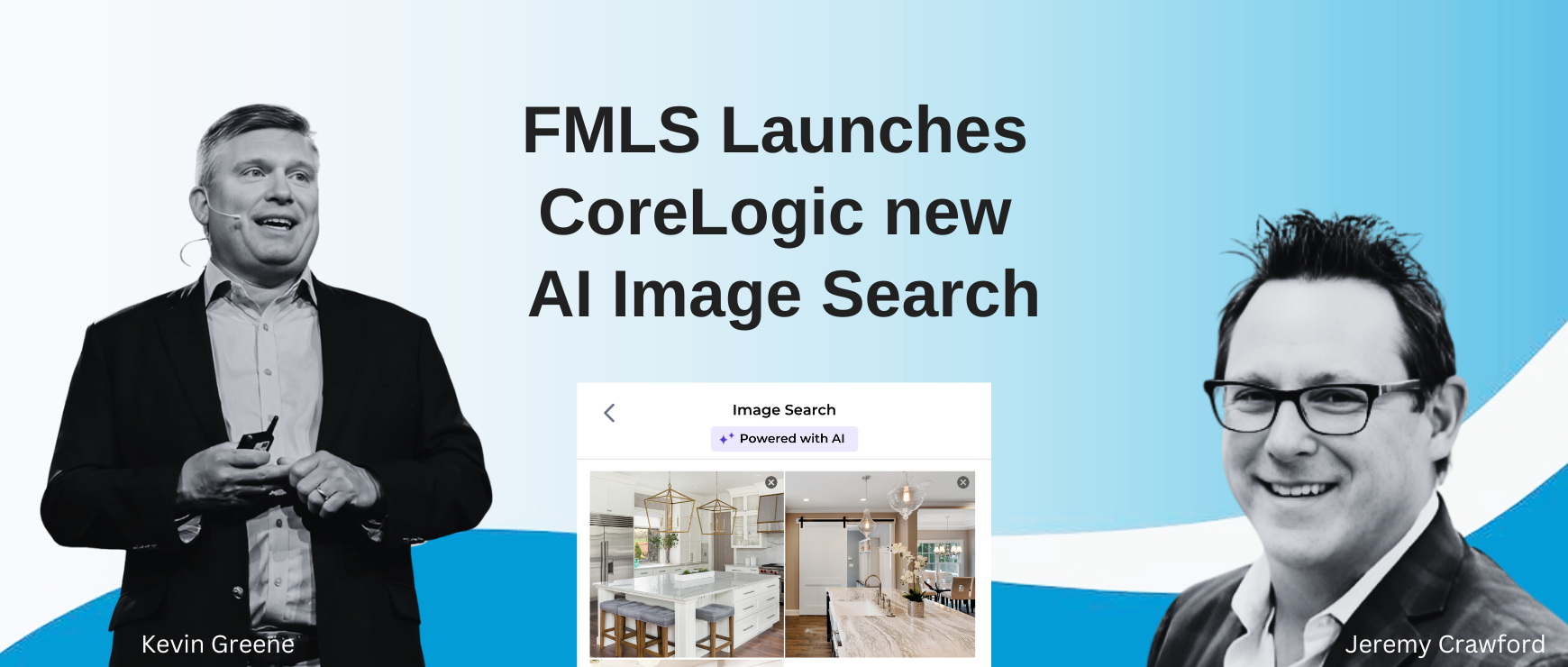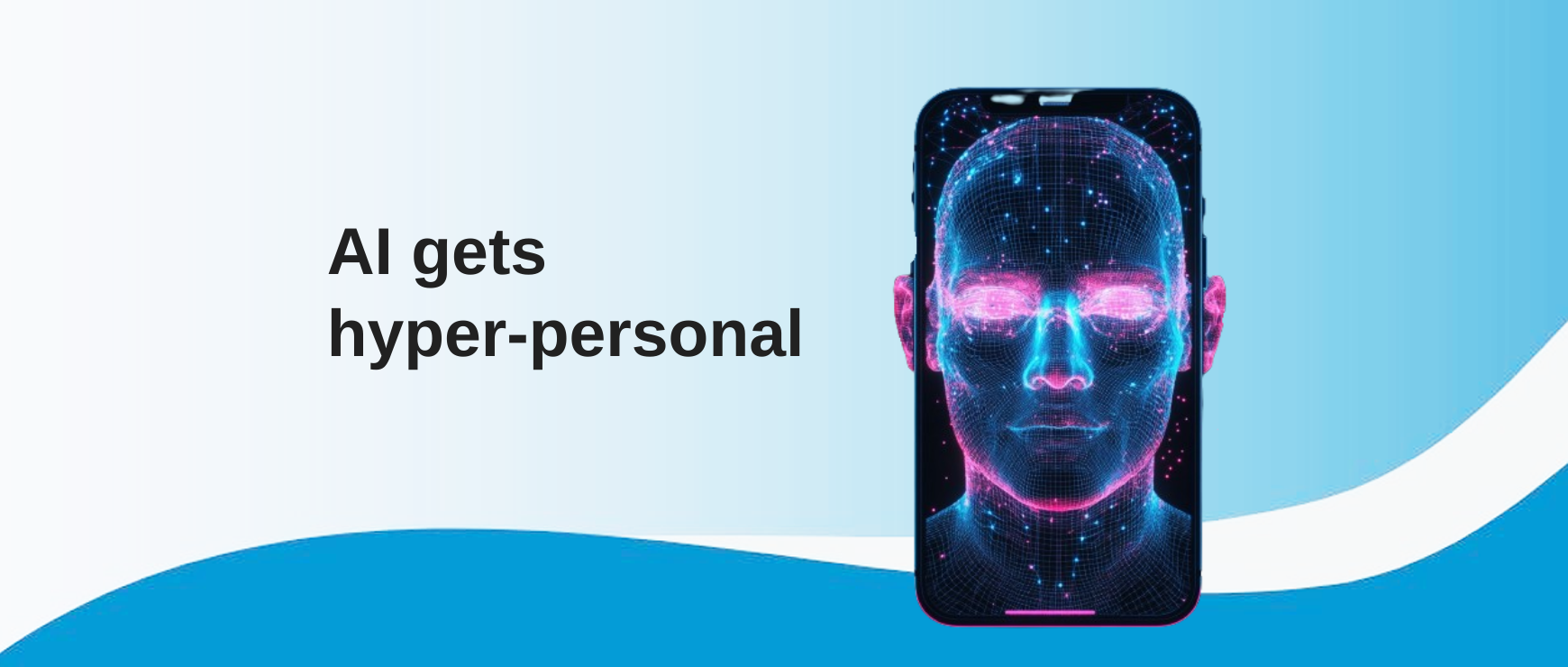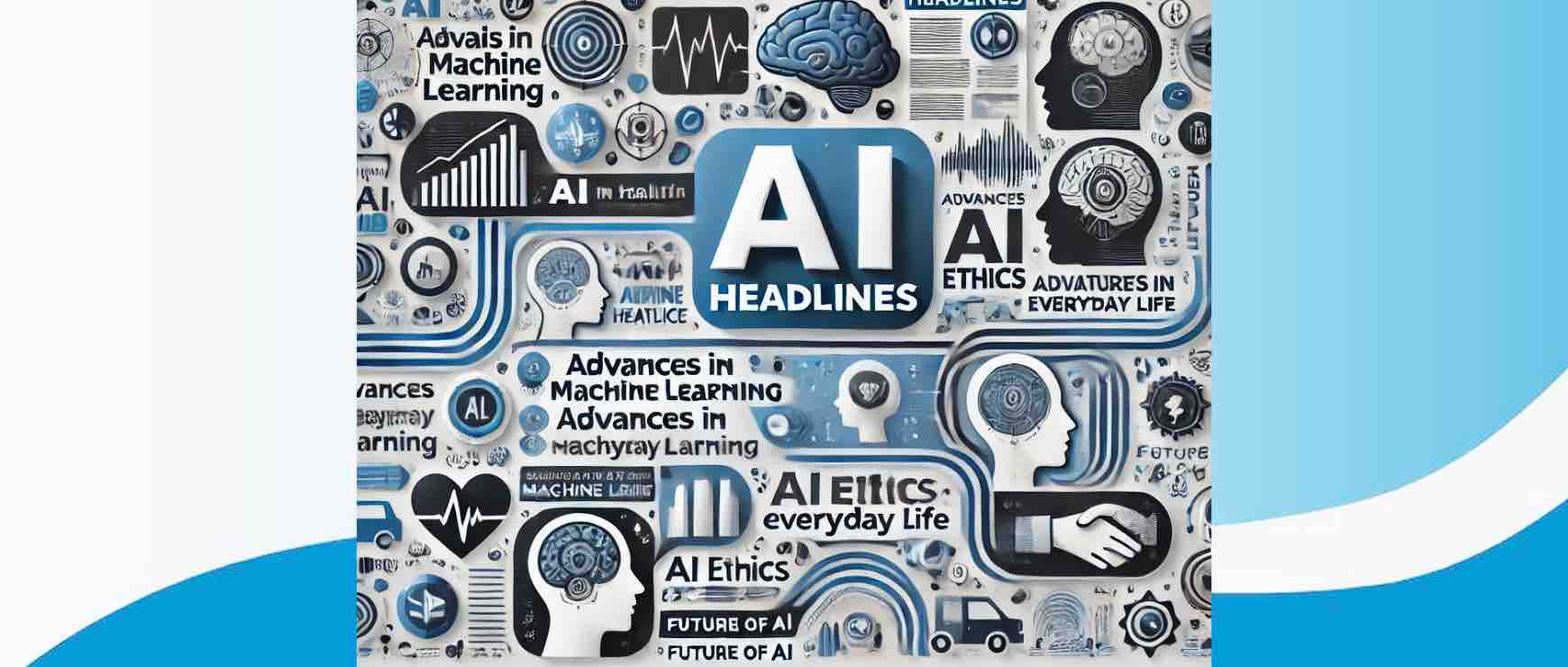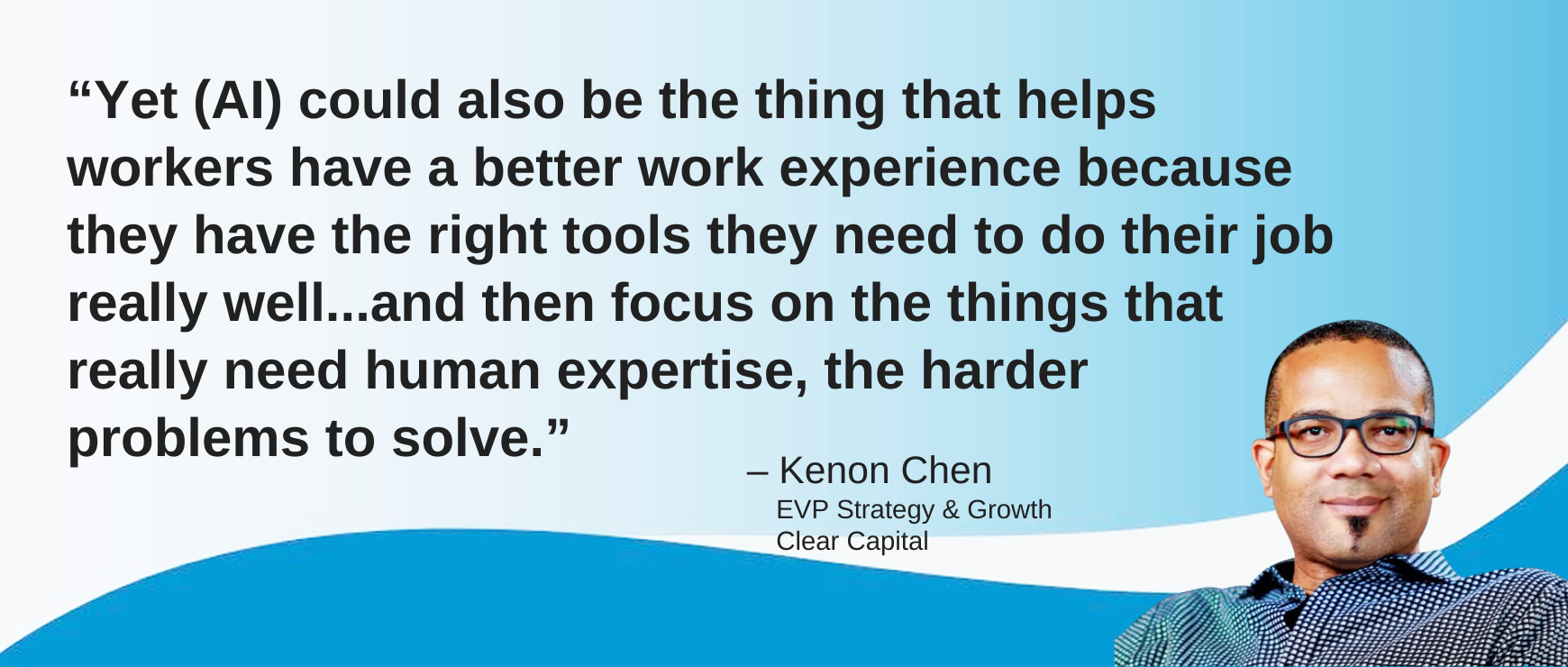By Kevin Hawkins with Korey Hawkins | Vol. 2 Post 33
REAL AI is a human-created weekly roundup of all things AI in real estate and emerging AI innovations in other sectors likely to impact real estate. We post a new edition every Friday, and our free newsletter is delivered to your inbox every Monday.
FMLS launches CoreLogic’s new AI Image Search in OneHome
Jeremy Crawford continues to champion practical AI solutions for real estate. The CEO of First Multiple Listing Service, the largest MLS in Georgia and the fifth largest in the US, is bringing to 57,000 agents one of the coolest, most practical new AI-powered tools for property search.
CoreLogic announced Thursday the addition of AI Image Search to its massively popular OneHome portal. Consumers get access through their FMLS member agent and then upload a photo representing a key home feature they want: a white chef’s kitchen, outdoor living room, vaulted wood ceiling, or simply a home’s exterior design.
Using computer vision, AI Image Search scours the FMLS listing database, focusing on the look and feel of the uploaded photo to provide properties with visual similarities. Like Google Image Search, homes listed for sale with the feature the buyer wants are displayed in the search results. (See video link below.)
“This completely transforms the way (buyers) can search for matching properties,” said Crawford.
As CoreLogic’s Kevin Greene notes, buyers often struggle to convey to their agents what they want. “It can be a challenge for buyers to define what they’re looking for, but they know what they like when they see it. This allows buyers to show, visually, what they want and find the closest matches.”
AI Image Search is like giving buyers access to the express lane on a highway because it can save them a lot of time, and they find the right homes to look at faster.
Greene says it allows agents to create “a better search experience for their clients,” and Crawford adds it delivers “more value to their clients and forms stronger connections with prospects.”
Research supports the impact of AI Image Search. Real estate computer vision leader Restb.ai found that buyers who click on these visual searches have a 5.5 times higher conversion rate than those who do not.
The second big benefit is eliminating comparables buyers don’t want to see. Removing wasted time viewing homes buyers won’t buy is a win for agents and their buyers.
FMLS may be the first to roll out the new CoreLogic OneHome superpower, yet many other MLSs will likely follow because of the OneHome platform’s pervasiveness and CoreLogic’s reach.
OneHome is the number one agent-invite-only collaboration platform with over 20 million monthly visits, 2.5 billion listing views, and one of the highest Net Promoter Scores or customers, exceeding the industry’s major portal NPS scores. If OneHome were a public site, it would rank about 6th overall in consumer home search.
CoreLogic is also home to North America’s No. 1 listing management platform, accessible by over 1 million real estate professionals.
You won’t find AI Image Search on Zillow, Redfin, realtor.com, or Homes.com, so for now, agents have a leg up on the competition, giving consumers something new they will love.
Property search pull-downs and box-checking may become a thing of the past as AI helps agents show buyers how to reimagine search and improve their home-buying journey.
Note: A home buyer flyer on CoreLogic’s AI Image Search is here, an agent flyer is here, and a video is here. (-Kevin)
“The more things change, the more they stay the same” is proving to be true as AI becomes embedded into our daily lives.
The phrase comes from a collection of essays and epigrams by French writer Jean-Baptiste Alphonse Karr. In his 1849 “Les Guêpes” (The Wasps), he wrote, “plus ça change, plus c’est la même chose,” or “the more it changes, the more it’s the same thing.”
The drive in AI today is personalization, leading a new movement of “high tech and high touch.”
As we have reminded readers, “high tech, high touch” comes from another book 133 years later. John Naisbitt’s 1982 book “Megatrends” explored the importance of technology and human touch coexisting and complementing each other.
AI continues to prove both true. Naisbitt’s theory is that as technology becomes more pervasive in our daily lives, the human desire for personal connection and interaction will grow stronger: that’s what we are seeing today, 42 years later.
AI offers a new twist to high-tech, high-touch
The difference is what AI can do in terms of hyper-personalization – at scale. The AI “all about me” movement is clear. Take Apple Intelligence, which will leverage the data and habits from your most personal tech device: your phone.
Next, Google just announced several new Gemini features, including a series of extensions that will allow Gemini users to pull in data from not only your Gmail but also Keep, Tasks, Utilities, and YouTube Music.
Think about how much data Google has on you to personalize your experience. If you are a Google user, they likely know more about you than any other tech firm on earth: everything you have searched, including incognito mode.
In Google’s blog post, they write:
“Let’s say you’re hosting a dinner party: Have Gemini dig out that lasagna recipe Jenny sent you in your Gmail, and ask it to add the ingredients to your shopping list in Keep. And since your guests are your college friends, ask Gemini to “make a playlist of songs that remind me of the late ’90s.“ Without needing too many details, Gemini gets the gist of what you want and delivers.“
More is coming as Google teases a new Calendar extension, adding, “You’ll be able to snap a photo of a concert flier and ask Gemini if you’re free that day—and even set a reminder to buy tickets.“ Now that’s convenient!
The “why“ in personalized AI
According to a new report from CoreMedia, “Three Pillars of Customer Experience,“ research shows that a near majority (48%) of consumers expect firms to use personal knowledge – shopping preferences and behavior – to serve customized recommendations.
Yet today, 94% are disappointed because they don’t receive personalized customer service support.
Moreover, two-thirds of online consumers feel that companies neglect the human aspect of the online experience.
A balance is required between being efficient and providing human-powered help.
AI can excel in this area because it can free up more time for human interaction. The mistake some companies are making (like FedEx) is they are relying on digital efficiency to replace human interaction.
“AI is simply a tool created by human hands,“ as Delta Media’s Micheal Minard wrote. As AI progresses in our daily lives, we need to make sure human hands remain in control of this tool and not the other way around.
The power of AI lies in not replacing the human touch but empowering more of it. (-Kevin)
- 70% of the people who do not use generative AI stated that they would have used the technology if they had more knowledge about the technology – Salesforce
- 41% of US executives stated concern about AI reducing opportunities in their workplaces – KPMG
- Nearly 2 out of 3 students (66%) surveyed admitted to using generative AI to complete their essays and written assignments – Forbes
- 50% of marketers said they use generative AI for audio creation or voice creation – Botco
- 60% of the population worldwide is likely to use AI by the end of 2024 – Forrester
Source: OpenAI Journey (-Korey)
How can seniors learn about AI’s benefits and threats? Take a free class – here’s how | 8/13/24 ZDNET
What a great marketing tactic to engage boomers: share this story!
Gemini Live, Google’s answer to ChatGPT’s Advanced Voice Mode, launches | 8/13/24 TechCrunch
The AI war between OpenAI and Google continues to heat up as Google gives Gemini a voice.
This New Grammarly Tool Aims to Tell If AI Wrote a Document | 8/14/24 Inc.
Grammarly Authorship will attempt to determine if it was created by a human or AI – almost all of these tools fail.
Google’s new Pixel 9 can search your screenshots with AI | 8/13/24 The Washington Post
Pixel Screenshots will end scrolling through your photos to find the right image.
Artificial intelligence leads office rebound in San Francisco | 8/14/24 The Real Deal
Is SF headed for a comeback? Commercial real estate execs are smiling as AI companies are buying. (-Korey)
Subscribe to our free REAL AI newsletter here.
Content suggestions welcomed: email korey@wavgroup.com.








